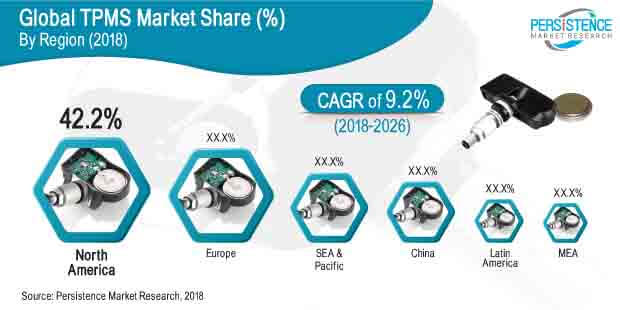Automotive Tire Pressure Monitoring Systems (TPMS) are active safety systems that help monitor the tire pressure of vehicles by using pressure sensors or through the wheel speed sensors of ABS/ESC systems. Batteries used in TPMS generally have a lifespan of 6 to 10 years. Moreover, the entire TPMS has to be replaced if the battery dies.
The global TPMS market is estimated to be valued at US$ 11,651.2 Mn by the end of 2018 and reach US$ 23,620.5 Mn by the end of 2026, at a CAGR of 9.2% over the forecast period. The global TPMS market is anticipated to represent an incremental opportunity of US$ 11,969.3 Mn between 2018 and 2026.
Get Sample Copy Of This Report @ https://www.persistencemarketresearch.com/samples/3630
Factors Influencing the Growth of the Global TPMS Market
Growing regulations to mandate the installation of TPMS in developed regions such as North America, Europe and China act as a catalyst in the overall growth of the TPMS market. Moreover, healthy growth in the automotive industry will also be a prime factor supplementing the TPMS market growth over the forecast period. Furthermore, increase in the adoption of automotive safety systems is among the key factors responsible for driving the TPMS market.
The global TPMS market is estimated to be driven by an increase in the production of vehicles across the globe. Lucrative growth in the automotive industry is also expected to be a prime factor supplementing market growth.
Global TPMS Market Segmentation and Forecast
The global TPMS market can be segmented on the basis of type, vehicle type, sales channel and region. On the basis of type, the global TPMS market can be segmented into direct and indirect. On the basis of vehicle type, the market can be segmented into passenger car, light commercial vehicle (LCV), heavy commercial vehicle (HCV). Based on sales channel, the market can be segmented into Original Equipment Manufacturer (OEM) and aftermarket. Significant regions covered in the report include North America, Latin America, Europe, SEA & Pacific, China and the Middle East & Africa.
Global TPMS Market Analysis by Type
The direct type segment is projected to account for an 89.2% volume share in the global TPMS market by the end of 2026, increasing at a CAGR of 9.0% over the forecast period.
Global TPMS Market Analysis by Vehicle Type
Among the vehicle type segments, the passenger car segment is projected to dominate the global TPMS market in 2018. The passenger car segment is projected to account for an 83.1% market value share by the end of 2026.
Global TPMS Market Analysis by Sales Channel
The OEM segment is estimated to dominate the global TPMS market with a volume share of 60.7% by the end of 2026 end with a CAGR of 9.1%. The aftermarket segment is anticipated to gain traction in the coming years.
Global TPMS Market Analysis by Region
From a regional perspective, North America is estimated to represent 37.0% of the market volume share in 2018. The market is expected to increase at a volume CAGR of 8.3% over the forecast period. The sales revenue of TPMS batteries in North America is expected to reach US$ 9,461.4 Mn by the end of 2026 with a CAGR of 8.5% over the forecast period. Market growth in China and SEA & Pacific is expected to remain high as compared to the global average. The regions are expected to register respective CAGRs of 10.3% & 10.0% over the forecast period.

Request For Methodology @ https://www.persistencemarketresearch.com/methodology/3630
Key Players Dominating the Global TPMS Market
Some of the key market participants reported in this study of the global TPMS market include ZF Friedrichshafen AG, Continental AG, Sensata Technologies, Inc., Denso Corporation, Pacific Industrial Co., Ltd., NXP Semiconductors, WABCO, Huf Hülsbeck & Fürst GmbH & Co. KG, NIRA Dynamics AB, Bendix Commercial Vehicles Systems LLC, Dunlop Tech GmbH, Hamaton Automotive Technology Co., Ltd., Bartec USA LLC and ATEQ.
